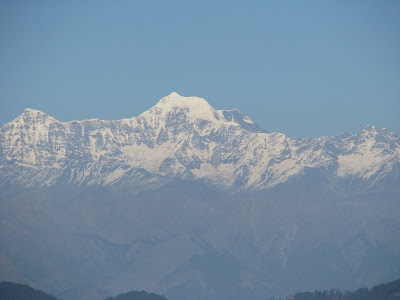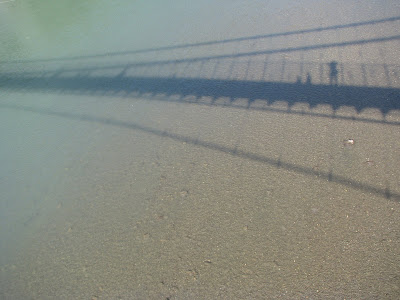Bombay has faced terrorist attacks at the Taj, Oberoi (Trident and Hilton) and at other places. It was not the first time that this has happened but the first question was "Why the Taj?" A place which has become synonymous with Bombay's coastline couldn't have done harm to anyone. We were disgusted to watch the events unfold and hurriedly called all whom we knew in Bombay. A friend of mine works at the Hilton and escaped unhurt. Thank god.
My mother and I were discussing how this could come to an end. I said that either we reach a state of paranoia where every single individual in any city is thoroughly frisked and everyone is treated as a potential terrorist (why is that so scary? They do it at airports, don't they!?) or we realise that till the human race exhausts itself of people to kill nothing much can be done. Naive? Yes and helpless too. That was Bombay suffering out there.
I am glad that the armed forces (NSG, police, commandoes, et al) did a decent job of bringing things to an end. I am glad that the media covered a lot of what was happening providing relief to many anxious souls across India. I salute all those who laid their lives down in the line of duty.
What follows is not something to taint whatever right was done or sully the appropriate contributions of those who participated in the operations. What follows is an examination (to the best of my abilities) of how wrong certain things still are.
Media:
I think Rajdeep Sardesai should be hanged till death. He is the most lecherous and stupid reporter I have ever seen. All that he is interested in is sensationalism and is desperate to sound very clever and sharp. He is neither. I watched him gather input from two reporters and couldn't believe the irresponsibility with which he extrapolated it to conclusions with the least concern for what the effect would be on public. I was happy to hear that news channels were taken off the air in south Bombay. I can only imagine the panic his words would have unleashed. Here is a paraphrasing of what I saw and heard:
RS: We have reports coming in from our correspondent in CST station which as many know was called Victoria Terminus and was renamed by the Shiv Sena government (like that matters now). Rohit, what can you tell us about the situation there.
Rohit: There has been some indiscriminate shooting happening in the CST station and some exchange of fire. The police
RS: Terrorists are taking over the station, Rohit? Please confirm this for me. Can you see the terrorists? How many do you think there are? Are these the same people who were in Taj? How many people have been killed?
Rohit: I am not sure whether they are still there. I think they boarded a car and ran away. (What? As in, you just said... never mind)
RS: They have fled is it? Since that exit is on that side it is quite likely these are the same people who are holed up in the GH and we have Prachi reporting from there. Prachi, can you tell me what is happening at the GH? Have the terrorists been opening fire at the people. We know it is a sensitive area and a soft target (of course, we have to throw in jargon now).
Prachi: There have been rumours of shooting here, Rajdeep and I just saw 3 persons being brought out of the hospital with their arms raised up in the air.
Rajdeep: 3 persons have been apprehended. This is the latest news that we are getting from our correspondent at the GH which is about 2 Km from CST (then how on earth did you assume that those who had fled were already at GH firing away!?). There seems to have been indiscriminate firing and 3 persons have been apprehended by the Mumbai police. Can you confirm that there was firing (but you just confirmed it to the world. Why check again?)
Prachi: I don't know, Rajdeep but shopkeepers around here have downed their shutters and say that they heard shooting.
I could go on about how he simply rushed to conclusions and kept feeding the country/world with rumours. Rohit (or that is what I recall his name to be) soon (within a span of 5 minutes) came back saying that shooting was only happening on platforms 14 and 15 and then went on to say that there was no shooting because the railway police confirmed that there was no shooting.
Why don't the news channels simply wait and get concrete information before broadcasting it? I still remember days when news was broadcast only at 19:30 and then again at 21:30. There used to be a running ticker for "flash" news. Granted we can't have enough of news happening all around the world, but shouldn't there be some accountability here? Stupid ass Rajdeep goes on building his stories and acts as if he is prophet of all news. He has absolutely no consideration for the effect it will have on all the people who listen to him.
Other channels are no better. They kept roping in unrelated people and asked for their comments before cutting them off halfway for a commercial break or to show some recorded clipping or to ask someone else some other question. Some intelligent people like Mr. Benegal offered sensible suggestions but most others were busy trying to say something profound and floundered. Can we just have the news minus the drama? Why all this jargon like "War on Mumbai" and marketing phrases? It is a terrorist attack. Period.
Media nowadays treats news with savage deliberation unearthing hypothesis, monstrosities and being quite unflinching in displaying the vulgar details like a clinical coroner. Recently, I read this and realised that Indian media is doing nothing more than aping the West in their baseness. So wrapped up are they in the ways of the West that the only way they can describe this incident is in terms of 9/11. They call it "India's 9/11"!! Very original.
Business channels were worse. While people were concerned about lives, they were asking industry and business heads about the impact that this incident will have on the pharmaceuticals and IT sectors. Like it matters now! They kept calling people asking them whether it will mean lesser foreign investments and whether there was any hope of a gloomy future.
Military Inefficiency:
My one thought throughout was if Rambo could do it, why are these people blubbering around like kindergarten cops? I know that is being rather naive, but watching how SWAT teams function (and not just in movies but also on Discovery) and how the Navy Seals go about their mission, I found the NSG and commandoes very very amateurish. I am not an authority on military demarche but I sure can spot fumbling when I see it. Here are points that I gathered:
- Israeli experts say that commandos acted prematurely
- Commando spokesperson said that they did not know the layout of the Taj and hence, were quite helpless.
- Commandos were shown on TV shooting blindly into open windows (what if there were hostages in there?)
- Commandos blame delay in transport
- It was funny seeing soldiers wear camouflage and leaves in their helmets. As in, you are going to the Taj not the Sunderbhans!
- One soldier opened fire into an open window and then turned around calmly and walked over to talk to a commando. He was so open to the terrorists (if any) that he was a sitting duck! Very unprofessional.
When the commando major said that he didn't have the layout of the hotel and the staff too were not familiar with a particular floor, I was shocked. He went on to say that the terrorists seemed to know the floor layout very well and hence they (the commandos) simply were left with no choice but to follow them and their firing. But of course, the terrorists would know the layout. They are serious about the job they want to do unlike the armed forces. Foolish bravery is not what we need. It is like the story I had read back in school about a real soldier's opinion of a general's "bravery" in rushing headlong into the enemy formation.
The latest news is that the NSG are blaming the state govt. for delaying the transport and other operational glitches. We are pretty good at that!
Politicians:
Honestly, when will they grow up? One bunch of people wear bangles and keep throwing twigs at Pakistan without having the guts to gather sufficient information and if found guilty, whip their arse. Another set of politicians blame Pakistan for every single problem that might not have even occurred yet. Parties blame each other and make election slogans out of the mishap. There is no shame left in these mongrels. Advani is the lowest scum that there can be. Instead of focusing on contributing his entire force to the resolution of this problem he acts like a spoilt brat. Manmohan Singh is too soft to be a leader of a country facing terrorist attacks. He could do well leading a monastery or something like that. The Maharashtra govt. is pathetic with one minister saying that "incidents like these keep happening so there is nothing much one can do". If I were to agree with him, then the first thing we should see happen is the dissolution of all security service personnel employed to protect ministers and politicians. Death of politicians will also become incidents that will keep happening and not an Indian will complain about it. I would love to see Raj Thakeray come out and say that he will only allow the sons of the soil to rescue the hostages and capture the terrorists.
I think it is best for us to realise that we can never do away with terrorism. The more we find ways to suppress it, the more creative they are going to get (9/11 was creative). In a country as populated as India with Indians providing enough reasons for any silly person to flare up, it is impossible to keep everyone under check. With a rather shabby border and coastline security, I will not be amazed if they send in one terrorist a day for ever 10 miles of coastline and soon have an army inside India: all going undetected. We are plain reactionary. We tend to forget pretty soon. We don't care enough (because it didn't harm us directly). With so much to bother an average Indian I am not surprised if he is not sensitive to such problems. I'd rather have a few intelligent people solve a problem then the entire band of Indians (that's over a billion voices) wanting to solve it. I think we should gird up our loins and kick some buttocks if we truly care or just sit back and add one more way in which an Indian can die (and in black-cynicism hope that the population reduces). Make a joke of it and tease a boy in school for not having any relative killed in a bomb blast. Make him feel bad!
Frankly, I think we should shut up for a while, figure out what we need, have a single (set of) mind govern India (some speaker suggested an emergency), get our infrastructure in place (and not be shabby by suddenly protecting all hotels and then when a bomb goes off in a supermarket, protect all supermarkets!), send out a clear message that if any country is found to encourage terrorism in India we will eradicate them from the face of this earth and be on alert till we are sure we have eliminated them all or forever, whichever happens earlier. It is not just against terrorism. It is about conscious living.


